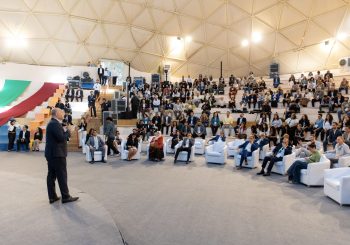In his book, The 5 Love Languages: The Secret to Love that Lasts (1992), American author Gary Chapman identified five ways that people use to express their love to each other.
Essentially, Chapman found out that people can receive expressions of love that are not connected to their own love languages. In knowing another’s love languages, Chapman argued that people can be sure they are truly loved.
The five love languages are: Words of Affirmation, Quality Time, Receiving Gifts, Acts of Service, and Physical Touch.
The whole idea is to meet those you love in conjunction with their way of receiving love, and vice versa. Although these five love languages are broad and universal, translating them can differ from culture to culture.
“I think we [in Egypt] have our own renditions, but ultimately they fit with Chapman’s five love languages,” highlighted Fayrouz Ibrahim, a postgraduate student at the American University in Cairo.
Egyptian Streets asked its audience about the Egyptian renditions of the five love languages, and here are some of their answers.
Words of Affirmation
“Verbal compliments, or words of appreciation, are powerful communications of love. They are best expressed in simple, straightforward statements of affirmation, such as: ‘you look sharp in that suit,’” explained Chapman.
Chapman divided verbal expressions into three categories: encouraging words, kind words, and humble words. Generally, Egyptians are unique with their expressions, and their compliments often sound quirky and notably funny.
Expressions such as Amar Arba’tashar — which translates to the full moon in the middle or the 14th day of the lunar month — is usually said when Egyptians want to extend kindness by expressing how beautiful someone is, and Allah yenawar ya ‘am Ahmed, which translates to ‘God light up Mr. Ahmed’, is often said by Egyptians when they want to express encouraging words to someone by giving them thanks or praise.
Quality Time
Chapman described quality time as the ‘right kind of time.’ He highlighted that quality time means giving someone your undivided attention, having quality conversation, learning to talk, and doing quality activities.
“I think helping my teita (grandmother) with kahk falls under quality time. Eating together on one sufra (dining table) during Eid also falls under quality time,” explained Hania Ibrahim when asked by Egyptian Streets, a Political Science Graduate at the American University in Cairo.
Quality time does not only constitute spending time together, but savoring every hour spent together and making it as meaningful as possible.
“Choosing to take the longer route to spend more time with someone despite Egyptian traffic is also considered a love language in Egypt,” stated Salma Farid, Applied Arts student at the German University in Cairo.
Receiving Gifts
Getting something when visiting someone is generally common in Egypt – from dessert, to flowers, and more, gift-giving is valued in Egypt. One of the most common examples of gift giving in Egypt is given in the form of the 3edeya, which is basically a sum of money given by older members of the family on special occasions.
Chapman underlined that gifts don’t need to be expensive or given on a weekly basis. He expressed that for some individuals, the worth of the gifts has almost nothing to do with their monetary value, and ‘everything to do with love.’
“Everytime I would tell my father that I liked a specific kind of food, especially fruits, he would always end up buying it the next day in bulk as his way of showing love,” stated Malak Sherif, 23, Assistant Brand Manager at Ariika.
Acts of Service
Sometimes, “actions speak louder than words.” Egyptians are generally helpers by nature, if an individual is ever lost and needs directions, stranded with a flat tire, or generally just helpless, Egyptians usually step up their game.
“Making an erba (heating pad) for someone on a cold day or when women are on their period to ease their pain is an underrated act of service,” underscored Selina Nashaat, Graphic Design student at the American University in Cairo.
“My father’s love language is evident when he cooks me three meals a day and when I’m tired, he makes sure to always check my temperature and takes care of me. He is not really big on hugs or sweet words, but always shows his love with his actions,” said Bassant Othman, a 27-year-old veterinarian.
Physical Touch
Though physical touch between genders is largely restricted due to cultural limitations, it is practiced between family members.
For example, some Egyptians have the habit of kissing their mothers on the head as a way of showing love and appreciation.
Although Champan underlined that the five love languages are universal, he stated that the dialects in which these languages are spoken will differ from culture to culture. When the cultural adaptations are made, the five love languages will have a profound impact on how individuals deal with each other.
“Love doesn’t erase the past, but it makes the future different. When we choose active expressions of love in the primary language…we create an emotional climate where we can deal with our past conflicts and failures,” Chapman expressed.
Some individuals will instantaneously know their primary love languages, for others, it will not be that easy. However, it is important to take the time to understand one another’s languages, or, in the case of Egypt, recognize the affections as soon as we land a big batch of home-made wara2 3einab (stuffed vine leaves).







Comments (0)